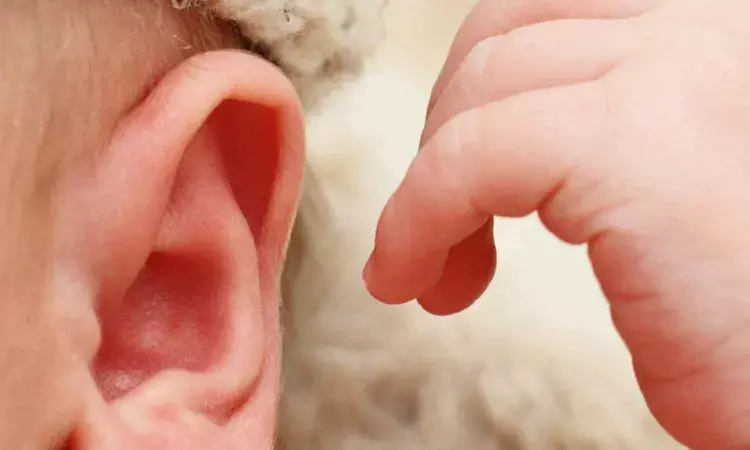- Home
- Medical news & Guidelines
- Anesthesiology
- Cardiology and CTVS
- Critical Care
- Dentistry
- Dermatology
- Diabetes and Endocrinology
- ENT
- Gastroenterology
- Medicine
- Nephrology
- Neurology
- Obstretics-Gynaecology
- Oncology
- Ophthalmology
- Orthopaedics
- Pediatrics-Neonatology
- Psychiatry
- Pulmonology
- Radiology
- Surgery
- Urology
- Laboratory Medicine
- Diet
- Nursing
- Paramedical
- Physiotherapy
- Health news
- Fact Check
- Bone Health Fact Check
- Brain Health Fact Check
- Cancer Related Fact Check
- Child Care Fact Check
- Dental and oral health fact check
- Diabetes and metabolic health fact check
- Diet and Nutrition Fact Check
- Eye and ENT Care Fact Check
- Fitness fact check
- Gut health fact check
- Heart health fact check
- Kidney health fact check
- Medical education fact check
- Men's health fact check
- Respiratory fact check
- Skin and hair care fact check
- Vaccine and Immunization fact check
- Women's health fact check
- AYUSH
- State News
- Andaman and Nicobar Islands
- Andhra Pradesh
- Arunachal Pradesh
- Assam
- Bihar
- Chandigarh
- Chattisgarh
- Dadra and Nagar Haveli
- Daman and Diu
- Delhi
- Goa
- Gujarat
- Haryana
- Himachal Pradesh
- Jammu & Kashmir
- Jharkhand
- Karnataka
- Kerala
- Ladakh
- Lakshadweep
- Madhya Pradesh
- Maharashtra
- Manipur
- Meghalaya
- Mizoram
- Nagaland
- Odisha
- Puducherry
- Punjab
- Rajasthan
- Sikkim
- Tamil Nadu
- Telangana
- Tripura
- Uttar Pradesh
- Uttrakhand
- West Bengal
- Medical Education
- Industry
Gestational diabetes associated with higher refer rate in hearing screening of newborns, suggests study

Gestational diabetes mellitus (GDM) is defined as sugar intolerance during pregnancy and usually occurs during the 24th to 28th week of pregnancy.
Gestational diabetes associated with higher refer rate in hearing screening of newborns, suggests study published in the Annals of Otology, Rhinology & Laryngology.
Gestational diabetes mellitus (GDM) is associated with several adverse health conditions in newborns such as preterm birth, hyperbilirubinemia, macrosomia, respiratory distress.
However, the effect of GDM on the hearing sensitivity of newborns is still unclear. The study aimed to explore the effect of GDM on newborn hearing. The study aimed to explore the effect of GDM on newborn hearing. A systematic search was conducted using PubMed, Scopus, and CHINAL databases. Keywords like “gestational diabetes,” “diabetic pregnancies,” “hearing loss,” “hearing impairment,” and “hearing disorder” were used to form a search string. The Rayyan software was used for screening procedure.
The full-length articles were shortlisted, extracted, and appraised. Results: The 7 articles were included in the review. Findings suggest that hearing loss is more prevalent in newborns with GDM pregnancies than in non-GDM pregnancies. In addition, OAE findings were “referred during the first hearing screening of newborns with GDM pregnancies.” The refer rate of the first bilateral hearing screening was higher for newborns with GDM pregnancies. Furthermore, children of diabetic pregnancies were found to be at risk of bilateral hearing loss, particularly sensorineural in nature.
The present systematic review suggests an association between GDM and a higher refer rate in hearing screening. A multidisciplinary collaboration between gynecologists, pediatricians, and audiologists can smoothen the early detection of hearing loss in newborns with GDM pregnancies, leading to early intervention and better clinical outcomes to improve the quality of life of affected newborns.
Reference:
Aggarwal K, Ravi R. Effect of Gestational Diabetes Mellitus on Newborn Hearing: A Systematic Review. Annals of Otology, Rhinology & Laryngology. 2024;0(0). doi:10.1177/00034894241287014
Dr. Shravani Dali has completed her BDS from Pravara institute of medical sciences, loni. Following which she extensively worked in the healthcare sector for 2+ years. She has been actively involved in writing blogs in field of health and wellness. Currently she is pursuing her Masters of public health-health administration from Tata institute of social sciences. She can be contacted at editorial@medicaldialogues.in.
Dr Kamal Kant Kohli-MBBS, DTCD- a chest specialist with more than 30 years of practice and a flair for writing clinical articles, Dr Kamal Kant Kohli joined Medical Dialogues as a Chief Editor of Medical News. Besides writing articles, as an editor, he proofreads and verifies all the medical content published on Medical Dialogues including those coming from journals, studies,medical conferences,guidelines etc. Email: drkohli@medicaldialogues.in. Contact no. 011-43720751


